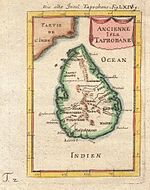
Back تاريخ سريلانكا Arabic Historia de Sri Lanka AST Шри-Ланка тарихы Bashkir Гісторыя Шры-Ланкі Byelorussian শ্রীলঙ্কার ইতিহাস Bengali/Bangla Història de Sri Lanka Catalan مێژووی سریلانکا CKB Dějiny Srí Lanky Czech Hanes Sri Lanca Welsh Historia de Sri Lanka Spanish
| History of Sri Lanka | ||||||||||||||||
|---|---|---|---|---|---|---|---|---|---|---|---|---|---|---|---|---|
 | ||||||||||||||||
| Chronicles | ||||||||||||||||
| Periods | ||||||||||||||||
|
||||||||||||||||
| By Topic | ||||||||||||||||
The history of Sri Lanka is unique because its relevance and richness extend beyond the areas of South Asia, Southeast Asia and the Indian Ocean. The early human remains which were found on the island of Sri Lanka date back to about 38,000 years ago (Balangoda Man).
The historical period roughly begins in the 3rd century BCE, based on Pali chronicles like the Mahavamsa, the Deepavamsa, and the Culavamsa.[1] They describe the history of Sri Lanka since the arrival of Prince Vijaya who was from Northern India[2][3][4][5] The earliest documents of settlement in the Island are found in these chronicles. These chronicles cover the period since the establishment of the Kingdom of Tambapanni in the 6th century BCE by the earliest ancestors of the Sinhalese. The first Sri Lankan ruler of the Anuradhapura Kingdom, Pandukabhaya, is recorded for the 4th century BCE. Buddhism was introduced in the 3rd century BCE by Arhath Mahinda (son of the Indian emperor Ashoka).
The island was divided into numerous kingdoms over the following centuries, intermittently (between CE 993–1077) united under Chola rule. Sri Lanka was ruled by 181 monarchs from the Anuradhapura to Kandy periods.[6][unreliable source?] From the 16th century, some coastal areas of the country were also controlled by the Portuguese, Dutch and British. Between 1597 and 1658, a substantial part of the island was under Portuguese rule. The Portuguese lost their possessions in Ceylon due to Dutch intervention in the Eighty Years' War. Following the Kandyan Wars, the island was united under British rule in 1815. Armed uprisings against the British took place in 1818 Uva Rebellion and 1848 Matale Rebellion. Independence was finally granted in 1948 but the country remained a Dominion of the British Empire until 1972.
In 1972, Sri Lanka assumed the status of a Republic. A constitution was introduced in 1978 which made the Executive President the head of state. The Sri Lankan Civil War began in 1983, including Insurrections in 1971 and 1987, with the 25-year-long civil war ending in 2009. There was an attempted coup in 1962 against the government under Sirimavo Bandaranaike.
- ^ Rathanasara, K (2023). "The Origins and Evolution of Sri Lankan Historiography". Journal of History, Archaeology and Architecture. 2 (2): 147–158 – via Researchgate.
- ^ Geiger, W. (1930). "The Trustworthiness of the Mahavamsa". The Indian Historical Quarterly. 6 (2): 228.
- ^ Gunasekara, B. (1995) The Rajavaliya. AES reprint. New Delhi: Asian Educational Services. p iii ISBN 81-206-1029-6
- ^ "Wh124 – Buddhism in South India – Unicode". bps.lk. Archived from the original on 4 March 2016. Retrieved 7 April 2016.
- ^ Holmstrom, Lakshmi (1 January 1996). Maṇimēkalai. Orient Blackswan. ISBN 9788125010135.
- ^ Ancient Kings and Rulers of Sri Lanka (Ceylon) Archived 12 December 2019 at the Wayback Machine. kapruka.com